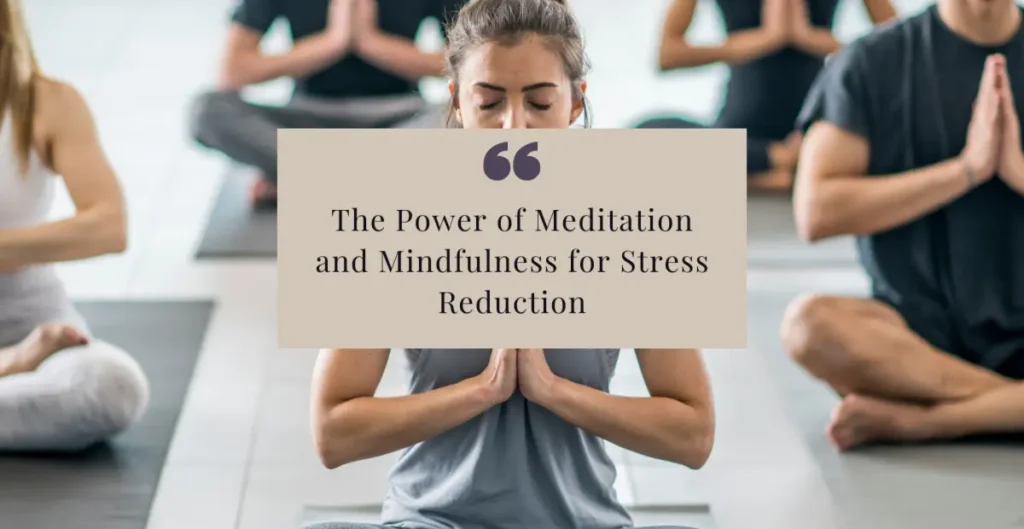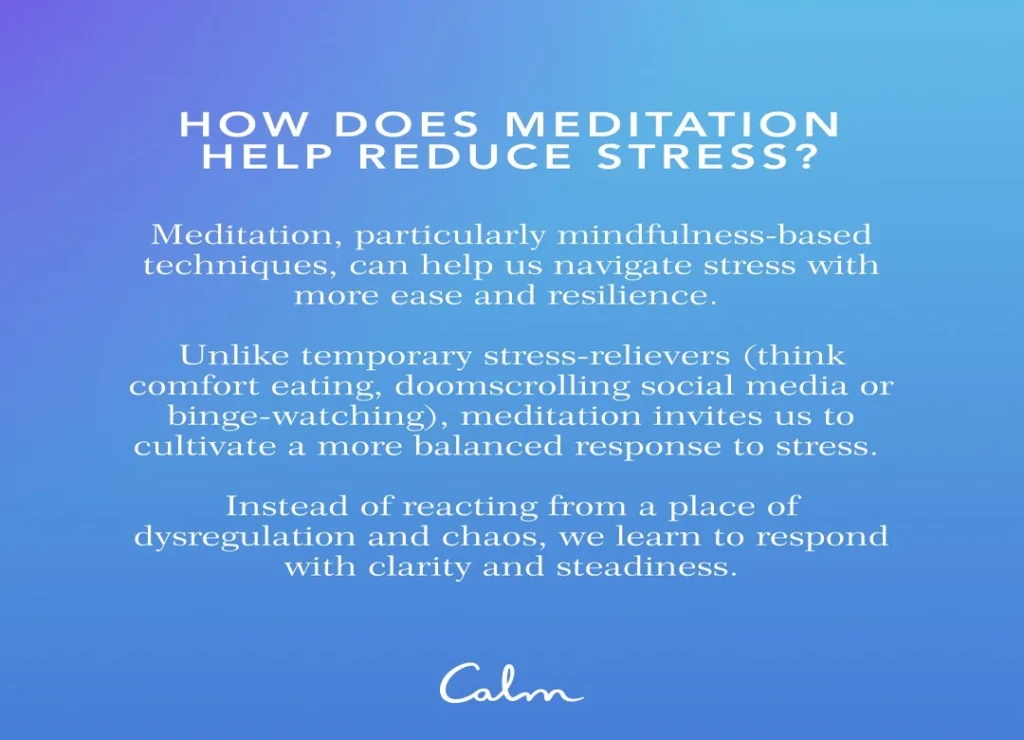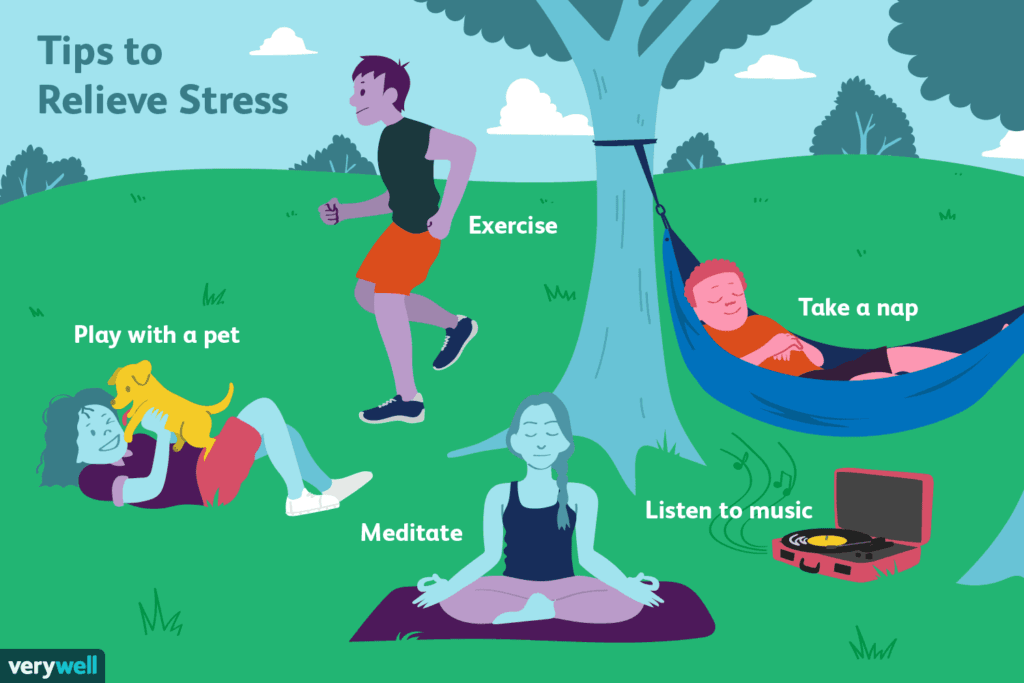Mindfulness is a powerful tool for managing and reducing stress. Specific exercises like deep breathing and body scans can help promote stress relief.
Incorporating mindfulness practices into your daily routine can lead to improved overall well-being and mental health. By focusing on the present moment and accepting your thoughts and feelings without judgment, you can cultivate a sense of calmness and reduce the impact of stress on your mind and body.
Through mindfulness, you can develop resilience to stressors and enhance your ability to cope with life’s challenges effectively. Start incorporating mindfulness exercises into your daily routine to experience the benefits of reduced stress and increased well-being.

Credit: mindbodycomplete.com
The Essence Of Mindfulness
Mindfulness is the practice of being fully present and aware of our thoughts, feelings, and surroundings without judgment. It is a powerful tool for managing and reducing stress, allowing us to cultivate a sense of calm and clarity amid life’s challenges. The essence of mindfulness lies in its ability to anchor us in the present moment, helping us let go of worries about the future and regrets about the past.
Roots In Ancient Practices
Mindfulness has its roots in ancient contemplative practices such as Buddhism, where it was used as a way to develop a deep understanding of the mind and achieve inner peace. These traditions emphasized the importance of being fully present in each moment, cultivating awareness, and letting go of attachment to thoughts and emotions.
Modern Adaptations And Research
In recent years, mindfulness has been adapted into secular contexts and extensively studied for its impact on mental well-being. Research has shown that regular mindfulness practice can lead to reduced stress, improved focus, and enhanced emotional regulation. This has led to the development of various mindfulness-based interventions aimed at promoting stress reduction and overall well-being.
How Mindfulness Can Help Manage And Reduce Stress
- Brings attention to the present moment.
- Helps in recognizing and accepting thoughts and emotions.
- Promotes relaxation and calmness.
- Enhances self-awareness and emotional regulation.
Specific Mindfulness Exercises Aimed At Stress Relief
- Deep breathing exercises
- Body scan meditation
- Mindful walking or movement
- Loving-kindness meditation
Stress And Its Impact On Health
Mindfulness techniques can be an effective way to manage and reduce stress. By practicing specific mindfulness exercises, individuals can learn to be more present in the moment and better equipped to handle stressors. These techniques include deep breathing, body scans, and guided meditations.
Stress is a natural response to challenging situations that trigger our body’s fight or flight response. While some stress can be beneficial, chronic stress can negatively impact our physical and mental health. Chronic stress can lead to high blood pressure, heart disease, obesity, and other health problems. Additionally, it can cause anxiety, depression, and other mental health issues.
Physical Repercussions
Chronic stress can manifest itself in various physical symptoms, including headaches, muscle tension, fatigue, and difficulty sleeping. The long-term impact of stress on the body can lead to chronic illnesses such as heart disease, digestive disorders, and autoimmune diseases. Mindfulness practices can help reduce these physical symptoms by helping individuals become more aware of their bodies and how they respond to stress.
Mental Health Considerations
Stress can also have a significant impact on mental health, leading to anxiety, depression, and other mental health issues. Mindfulness can help individuals manage their stress by increasing self-awareness and reducing negative thoughts. Mindfulness practices can help individuals focus on the present moment, rather than dwelling on the past or worrying about the future. This can help reduce anxiety and depression symptoms and improve overall mental health.
Specific Mindfulness Exercises Aimed At Stress Relief
Mindfulness practices can be incorporated into daily life to help manage and reduce stress. Some specific mindfulness exercises aimed at stress relief include:
- Mindful breathing exercises
- Body scan meditation
- Mindful movement practices, such as yoga or tai chi
- Guided imagery and visualization exercises
- Mindful eating practices
By practicing mindfulness regularly, individuals can develop the skills to manage stress more effectively and improve their overall health and well-being.
Mindfulness As A Stress Reliever
Mindfulness is a powerful practice that can help manage and reduce stress. By bringing our attention to the present moment and cultivating awareness, we can develop a greater sense of calm and resilience in the face of stressors. In this article, we will explore specific mindfulness exercises aimed at stress relief.
Connecting Mind And Body
Mindfulness allows us to connect our mind and body, creating a harmonious relationship between the two. By focusing on our breath, bodily sensations, and emotions, we can develop a deeper understanding of how stress manifests in our bodies. This awareness helps us recognize when stress arises and empowers us to respond to it healthily and productively.
Cultivating Present-moment Awareness
One of the key aspects of mindfulness is cultivating present-moment awareness. Often, stress arises from dwelling on past events or worrying about the future. By training our minds to stay focused on the present moment, we can break free from the cycle of stress and anxiety. Mindfulness exercises such as body scans, where we systematically bring our attention to different parts of our body, can be incredibly effective in grounding us in the here and now.
In addition to body scans, another helpful exercise is mindful breathing. By paying attention to each inhalation and exhalation, we can anchor ourselves in the present moment and find a sense of calm. This practice can be done anywhere, whether you’re sitting at your desk or waiting in line at the grocery store.
Another effective technique is mindful walking. By focusing on the sensations of each step, the movement of our feet, and the sounds around us, we can bring ourselves into the present moment and let go of stress. This exercise is particularly beneficial when practiced in nature, allowing us to connect with the soothing rhythms of the natural world.
Mindfulness is a powerful tool for managing and reducing stress. By connecting our mind and body and cultivating present-moment awareness, we can develop a greater sense of calm and resilience. Incorporating mindfulness exercises into our daily routine can help us navigate stressful situations with greater ease and promote overall well-being.

Credit: www.calm.com
Starting With Mindful Breathing
Begin your journey to stress reduction with mindful breathing. Practice specific mindfulness exercises to manage and alleviate stress, promoting a sense of calm and balance in your daily life. By incorporating mindfulness into your routine, you can experience the powerful benefits of stress relief.
Breathwork Techniques
Starting with Mindful Breathing is a powerful way to reduce stress and cultivate a sense of calm and presence. By focusing our attention on the breath, we can bring ourselves back to the present moment, letting go of worries and anxieties. Mindful breathing is a simple yet effective mindfulness exercise that can be practiced anywhere, anytime.
Incorporating Breath Awareness Daily
Incorporating breath awareness into your daily routine is a wonderful habit to develop. By dedicating just a few minutes each day to focus on your breath, you can experience significant reductions in stress levels. Here are a few breathwork techniques you can try:
- Deep Belly Breathing: Sit or lie down in a comfortable position. Place one hand on your belly and the other on your chest. Take a slow, deep breath through your nose, allowing your belly to rise as you fill your lungs with air. Exhale slowly through your mouth, feeling your belly sink back down. Repeat this deep belly breathing for a few minutes, noticing the sensations in your body.
- Counting Breath: Find a quiet place where you can sit comfortably. Close your eyes and take a few deep breaths to relax. Now, start counting each breath cycle. Inhale deeply, then exhale fully, counting “one.” Inhale again, then exhale, counting “two.” Continue this pattern until you reach ten, then start again from one. If your mind wanders, gently bring your attention back to the counting.
- Box Breathing: Sit in a comfortable position and close your eyes. Imagine drawing a box with your breath. Inhale slowly through your nose to a count of four, imagining the first side of the box. Hold your breath for a count of four, imagining the second side. Exhale slowly through your nose or mouth for a count of four, imagining the third side. Finally, hold your breath for a count of four, completing the box. Repeat this cycle for several minutes, feeling the calming rhythm of the breath.
By incorporating these breathwork techniques into your daily routine, you can enhance your mindfulness practice and better manage and reduce stress. Remember, the breath is always there, serving as an anchor to the present moment. Take a few moments each day to connect with your breath and experience the transformative power of mindfulness.
Body Scan Meditation
Body Scan Meditation is a mindfulness technique that involves focusing on each part of the body to bring awareness and relaxation. It is a powerful tool for managing stress and promoting a sense of calm and well-being.
Guided Body Scan Steps
1. Find a comfortable and quiet space to lie down or sit in a relaxed position.
2. Close your eyes and take a few deep breaths to center yourself.
3. Start by bringing your attention to your toes, noticing any sensations or tension.
4. Slowly move your focus up through each part of your body, from your feet to your head, releasing any tension as you go.
5. Take your time and be present in each area, breathing deeply and consciously relaxing the muscles.
6. Once you reach the top of your head, take a few moments to experience your body as a whole, feeling a sense of relaxation and peace.
Benefits For Stress Reduction
- Reduces muscle tension and promotes relaxation
- Enhances self-awareness and mindfulness
- Helps in identifying and releasing sources of stress and anxiety
- Improves overall mental and emotional well-being
Mindful Movement Practices
Discover the power of mindful movement practices for stress reduction. Learn how mindfulness can effectively manage and reduce stress through specific exercises aimed at promoting relaxation and emotional well-being. Embrace the transformative potential of mindful movement in your journey towards a calmer, more balanced life.
Yoga For Mindful Stress Management
Tai Chi And Qigong
Mindful Movement Practices involve gentle exercises to reduce stress and promote relaxation.
Yoga for Mindful Stress Management focuses on breath awareness and gentle movements.
Tai Chi and Qigong emphasize flowing movements and mind-body connection.
Both practices enhance mindfulness and stress reduction effectively.
Daily Mindfulness Habits
Daily Mindfulness Habits play a crucial role in reducing stress and promoting overall well-being.
Mindful Eating
Eat slowly, focus on each bite, and savor the flavors.
Mindful Walking
Feel the ground beneath your feet and the air around you.
Cognitive Strategies For Mindfulness
Cognitive strategies for mindfulness can help manage and reduce stress. Mindfulness exercises, such as deep breathing and body scan, can aid in stress relief. By focusing on the present moment, mindfulness can help individuals become more aware of their thoughts and emotions, leading to better stress management.
Reframing Thoughts
Mindfulness teaches us to view stress-inducing thoughts objectively.
By reframing negative thoughts, we reduce their impact on our well-being.
This cognitive shift helps in managing stress more effectively.
Acceptance And Commitment
Acceptance of our thoughts and feelings is crucial for stress reduction.
Committing to staying present helps in acknowledging stress without judgment.
This practice fosters a sense of calm and emotional resilience.
Overcoming Challenges In Mindfulness Practice
Discover how mindfulness practice aids stress reduction through targeted exercises. Cultivate awareness to manage and alleviate stress effectively.
Dealing With Distractions
Dealing with distractions is essential for effective mindfulness practice. To manage distractions, acknowledge them without judgment. Use breathing techniques to refocus your attention.
Staying Consistent
Consistency is key in mindfulness practice. Set a schedule and practice at the same time daily. Start with short sessions to build consistency.
In mindfulness practice, overcoming challenges is crucial. Dealing with distractions and staying consistent is essential. Acknowledge distractions without judgment and set a daily practice schedule for consistency.
Mindfulness And Technology
Technology has become an integral part of our lives, offering tools and resources to support mindfulness practices. Incorporating technology into mindfulness routines can enhance accessibility and provide additional support for managing and reducing stress.
Apps To Aid Practice
When seeking mindfulness support, consider utilizing mobile applications designed to aid practice. These apps offer guided meditation sessions, breathing exercises, and relaxation techniques that can be accessed anytime, anywhere. Popular options such as Headspace, Calm, and Insight Timer provide a range of features to support stress reduction through mindfulness.
Online Resources And Communities
Engaging with online resources and communities can further enhance mindfulness practices. Explore websites, forums, and social media groups dedicated to mindfulness and stress reduction. These platforms offer valuable insights, tips, and support from a community of individuals striving for mindful living. Additionally, online courses and webinars can provide in-depth guidance and practices for integrating mindfulness into daily life.
Success Stories And Testimonials
Discover real-life success stories and testimonials showcasing how mindfulness effectively manages and reduces stress. Explore specific mindfulness exercises designed for stress relief, offering practical tools for a calmer, more balanced life.
Mindfulness has proven to be a powerful tool for managing and reducing stress. Countless individuals have experienced the benefits of incorporating mindfulness practices into their daily lives. Let’s take a look at some real-life examples and hear from those who have found success with mindfulness in their journey towards stress reduction.
Real-life Examples
1. John, a busy professional, struggled with chronic stress due to his demanding job. He decided to give mindfulness a try and started practicing meditation for just a few minutes each day. Over time, he noticed a significant reduction in his stress levels. John found that mindfulness helped him stay focused and calm in high-pressure situations, allowing him to tackle challenges with a clear mind.
2. Sarah, a stay-at-home mom, felt overwhelmed and constantly stressed by her responsibilities. She began incorporating mindfulness exercises into her daily routine, such as mindful breathing and body scans. Sarah found that these practices helped her become more present and aware of her emotions, allowing her to respond to stressful situations with greater patience and compassion.
Long-term Benefits
The success stories of individuals who have embraced mindfulness for stress reduction highlight the long-term benefits it can bring. Some of these benefits include:
- Improved Emotional Well-being: Mindfulness helps individuals develop a greater sense of self-awareness and emotional resilience, enabling them to navigate difficult emotions and reduce stress.
- Enhanced Focus and Concentration: By practicing mindfulness, individuals can train their minds to stay present and focused, improving their ability to concentrate on tasks and reducing stress caused by distractions.
- Increased Self-Care: Mindfulness encourages individuals to prioritize self-care and engage in activities that promote well-being, leading to a healthier and more balanced lifestyle.
- Better Relationships: Mindfulness fosters empathy and compassion, allowing individuals to build stronger and more supportive relationships, which can help alleviate stress.
- Overall Stress Reduction: Regular mindfulness practice rewires the brain, reducing the activation of the stress response and promoting a state of calm and relaxation.
These long-term benefits make mindfulness a valuable tool for managing stress and improving overall well-being. The success stories and testimonials from individuals who have experienced these benefits serve as inspiration for others seeking to incorporate mindfulness into their lives.
Integrating Mindfulness Into Therapy
Integrating mindfulness into therapy can be a powerful tool for managing stress. Mindfulness exercises, such as deep breathing and body scanning, can be used to help clients reduce stress levels and increase emotional awareness. By incorporating mindfulness techniques into therapy sessions, clients can learn to better cope with stress and improve their overall well-being.
Integrating Mindfulness into Therapy
Integrating mindfulness into therapy has become increasingly popular as a way to help individuals manage and reduce stress. Mindfulness-based approaches, such as Mindfulness-Based Stress Reduction (MBSR) and Mindfulness-Based Cognitive Therapy (MBCT), have shown promising results in the field of mental health. These approaches focus on cultivating present-moment awareness and non-judgmental acceptance, providing individuals with practical tools to navigate stressful situations. Let’s explore how mindfulness can be integrated into therapy to enhance stress reduction.
H3: Mindfulness-Based Stress Reduction (MBSR)
Mindfulness-Based Stress Reduction (MBSR) is a structured program developed by Jon Kabat-Zinn in the late 1970s. It incorporates mindfulness meditation, body awareness, and yoga practices to help individuals cope with stress, pain, and illness. MBSR aims to cultivate mindfulness through various exercises, such as body scans, mindful breathing, and mindful movement. By integrating MBSR into therapy sessions, individuals can learn to observe their thoughts and emotions without judgment, ultimately reducing stress levels and enhancing overall well-being.
H3: Mindfulness-Based Cognitive Therapy (MBCT)
Mindfulness-Based Cognitive Therapy (MBCT) combines elements of cognitive therapy with mindfulness practices. It was originally developed to prevent relapse in individuals with recurrent depression. MBCT emphasizes the connection between thoughts, emotions, and physical sensations, helping individuals develop a non-reactive and accepting attitude toward their experiences. By integrating MBCT into therapy, individuals can gain a deeper understanding of their thought patterns and learn to disengage from negative thinking, effectively reducing stress and preventing depressive relapse.
Integrating mindfulness into therapy can provide individuals with valuable tools to manage and reduce stress. By practicing mindfulness exercises, such as those found in MBSR and MBCT, individuals can cultivate present-moment awareness, develop a non-judgmental attitude, and gain a deeper understanding of their thoughts and emotions. Whether it is through mindfulness meditation, body scans, or mindful movement, integrating mindfulness into therapy can have a significant impact on stress reduction and overall well-being.

Credit: www.verywellmind.com
Frequently Asked Questions
How Can Mindfulness Help Manage Stress?
Mindfulness techniques, such as deep breathing and meditation, can help reduce stress by promoting relaxation and improving resilience to stressful situations. By focusing on the present moment, mindfulness can also reduce anxiety and promote a sense of calm.
What Are Some Specific Mindfulness Exercises For Stress Relief?
Specific mindfulness exercises for stress relief include deep breathing exercises, body scan meditation, mindful walking, and progressive muscle relaxation. These techniques help individuals to become more aware of their thoughts and sensations, promoting a sense of calm and relaxation.
Can Mindfulness Reduce The Physical Symptoms Of Stress?
Yes, practicing mindfulness can help reduce physical symptoms of stress such as muscle tension, headaches, and fatigue. By promoting relaxation and reducing anxiety, mindfulness can have a positive impact on the body’s physical response to stress.
Is Mindfulness Suitable For Everyone, Including Beginners?
Yes, mindfulness is suitable for everyone, including beginners. There are various resources available, such as guided meditation apps and online tutorials, to help individuals get started with mindfulness practice and experience its stress-relieving benefits.
Conclusion
Incorporating mindfulness practices into your daily routine can be a powerful tool for managing and reducing stress. By focusing on the present moment and practicing specific mindfulness exercises, you can learn to quiet your mind and find peace amidst the chaos of everyday life.
Whether it’s through guided meditation, deep breathing, or body scan techniques, taking the time to cultivate mindfulness can lead to a happier, healthier, and more stress-free life. So why not give it a try? Your mind and body will thank you for it.



![Buddhism for Beginners ([Buddhism for Beginners Book])](https://asksprit.com/wp-content/uploads/2024/06/buddhism-for-beginners-buddhism-for-beginners-book-150x150.jpg)